Mexico 1970 World Cup: 50 years ago
Mexico 1970, the ninth World Cup, is widely regarded as the greatest in living memory, won by its finest team. Though before my time, it is referenced by a generation as the finals where ‘the beautiful game’ triumphed, and casts a shadow over the World Cups which followed. It is chiefly remembered for Brazil’s historic third triumph in Pelé’s last tournament, the legendary team of Tostão, Rivelino and Jairzinho. The lasting image is of free-flowing games and attacking football, culminating in Carlos Alberto’s clinching goal in the Final and all relayed worldwide in vivid colour.
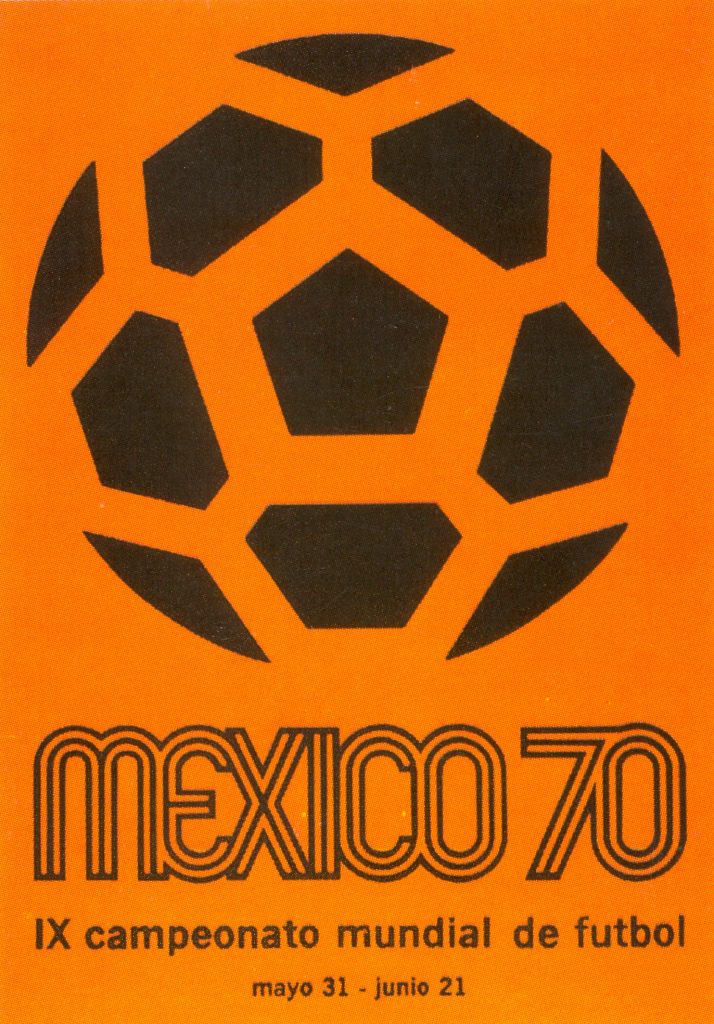


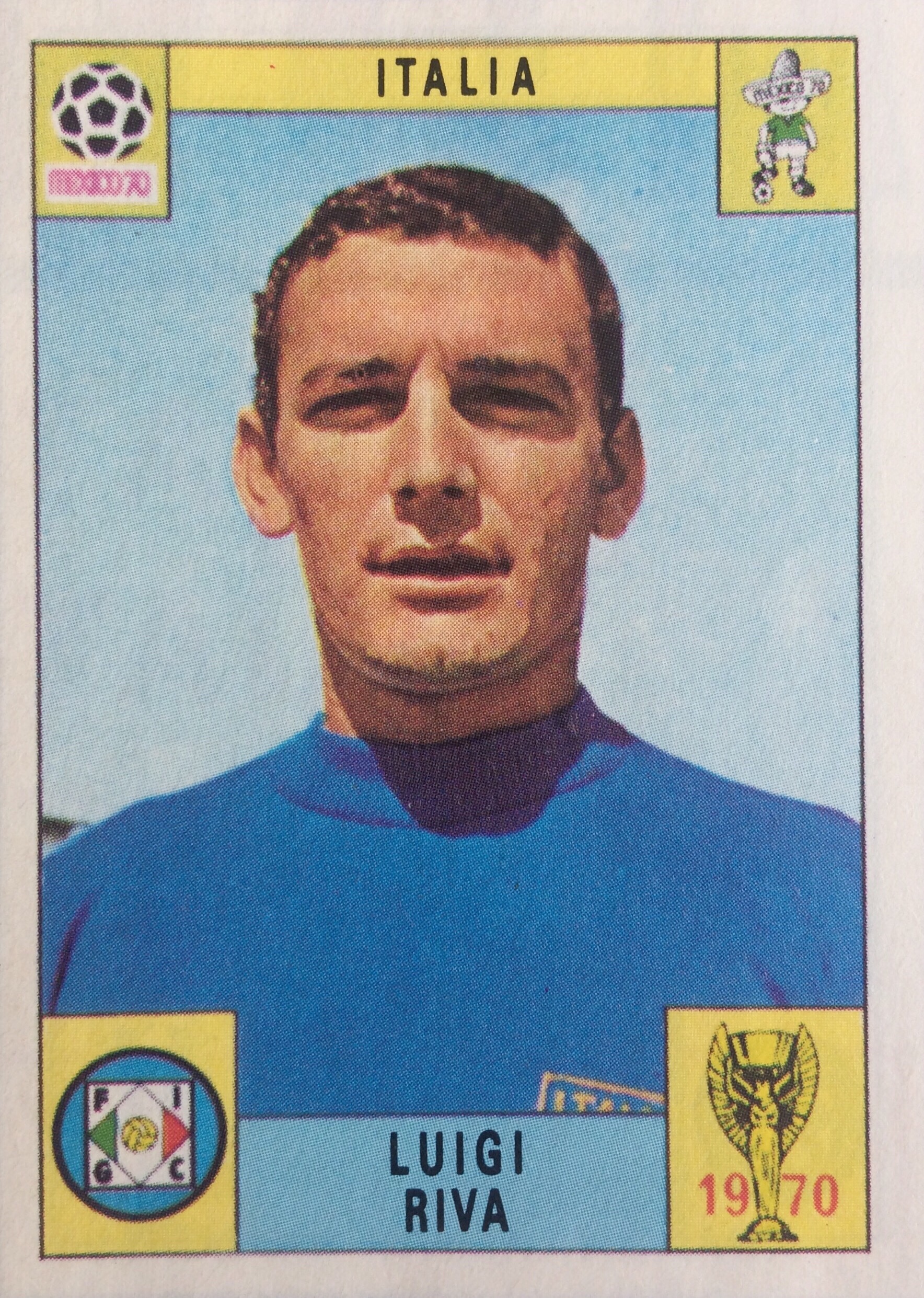

For Pelé, 29 years old and already a double World Cup winner (in 1958 and 1962), 1970 was the pinnacle of his career. His header which opened the scoring in the Final took him to total of 12 World Cup goals (in 14 appearances) and was Brazil’s 100th in the tournament. With four goals in total, he became the first man to score in four successive World Cup finals. Yet Pelé’s contribution to Mexico 1970 is also defined by his spectacular near-misses – Gordon Banks’s wonder save for England and the audacious efforts against Czechoslovakia and Uruguay in the semi-final.

Below: Brazil: World Beaters (Cleveland Golden Goals, 1972)


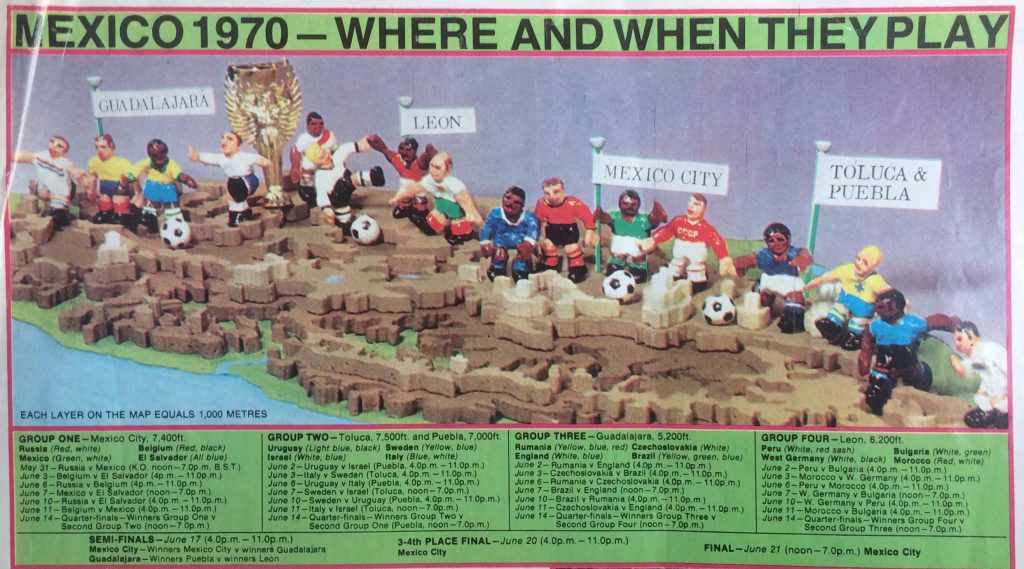
The goalscoring stats bear out the fond memories, with an average of 2.96 goals per game – the highest since 1958, and comfortably ahead of subsequent tournaments. The 10 goals of West German Golden Boot winner Gerd Müller remains the best tally of any top scorer in modern times. Peru returned to the World Cup after an absence of 40 years since the very first edition in Uruguay. They reached the quarter-finals as Teófilo Cubillas, the Young Player of the tournament, made his name with five goals – a feat he repeated in 1978. Overall, doubts about the infrastructure, logistics and temperatures of Mexico, the first host nation outside Europe or South America, were allayed. With the imposing Azteca Stadium in Mexico City its centrepiece, World Cup attendances averaged over 50,000 for the first time.
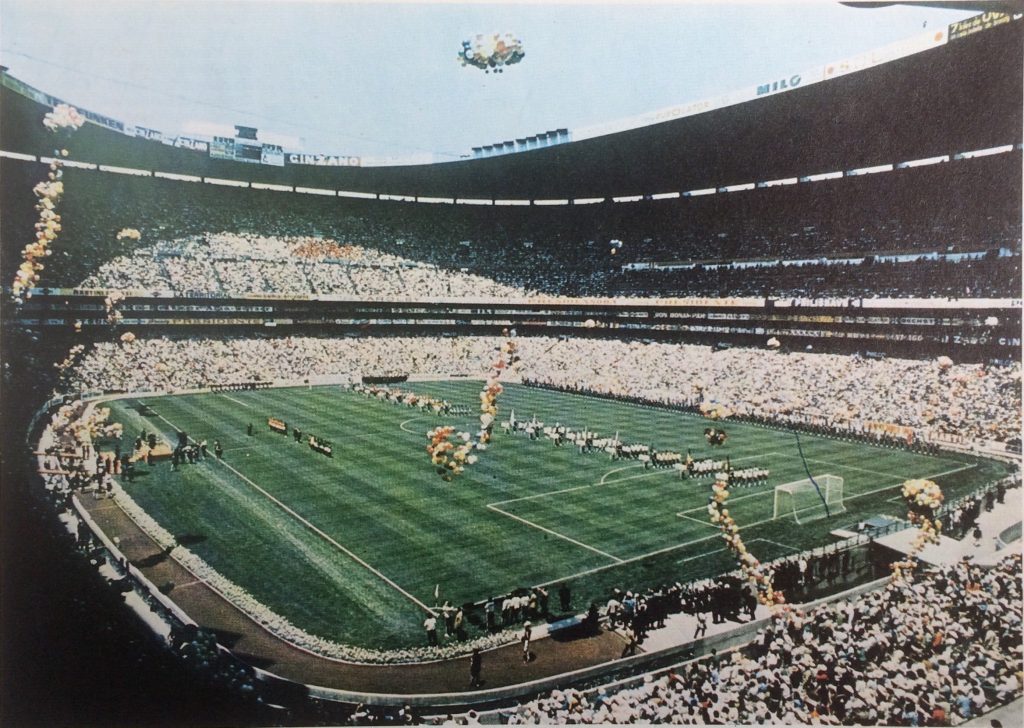
Mexico 1970 saw El Salvador, Israel and Morocco all make their debut appearance in the finals. Innovations included the introduction of red and yellow cards, trialled at the Mexico Olympics two years earlier. The USSR’s Evgeny Lovchev was shown the first yellow card in the opening game on 31 May, a goalless draw with Mexico, but there were no red cards in the tournament. With substitutions permitted for the first time, the USSR also made history when Anatoly Puzach replaced Viktor Serebrannikov in the same game. Mexico’s Juan Basaguren scored the first goal by a substitute against El Salvador a week later. Mário Zagallo became the first man to win the World Cup as player and manager, with Brazil being allowed to retain the Jules Rimet trophy in recognition of their third triumph.


England made meticulous preparations to retain their trophy, arriving in Mexico almost a month ahead of their opening fixture and playing friendlies in Colombia and Ecuador to acclimatize. Sir Alf Ramsey believed his side had “an excellent chance and that we have a stronger party than in 1966”. Ramsey worked with kit manufacturers Umbro to develop England’s light-weight Aertex shirts (the ‘Aztec’ jersey) to combat the conditions. However the squad were unsettled by the pre-tournament controversy of Bobby Moore’s arrest in Bogotá, Colombia. In the group stage they lost a close game with Brazil in the midday heat of Guadalajara, but went through with two 1-0 wins.


When Banks was ruled out on the eve of the quarter-final with West Germany, Peter Bonetti was brought in, though short of match practice. In another midday kick-off, England took a two-goal lead, only to collapse in the closing stages as Ramsey controversially substituted Bobby Charlton and Martin Peters. After Müller’s winner West Germany went on to lose a seven-goal semi-final with Italy, while England would have to wait 12 years to play in another World Cup.

Below: England prepare for extra time against West Germany

Off the pitch, the tournament was noticeably higher-profile than previous editions, with advances in broadcast technology allowing for worldwide colour TV coverage. Domestically, this World Cup set the template for panel discussion by pundits in the studio, a concept introduced by both domestic stations. The England squad also recorded a song, ‘Back Home’, which reached the top of the UK charts. Numerous magazines and newspaper supplements turned Mexico 1970 into a ‘media event’ with corporate sponsors and tie-ins such as the first Panini sticker collection, a mascot and a variety of souvenirs. The official football, the Adidas Telstar, sold in vast numbers following the tournament, though only 20 balls were used in the finals. Brazil’s beautiful game may have triumphed, but the signs were there for football’s commercial future.
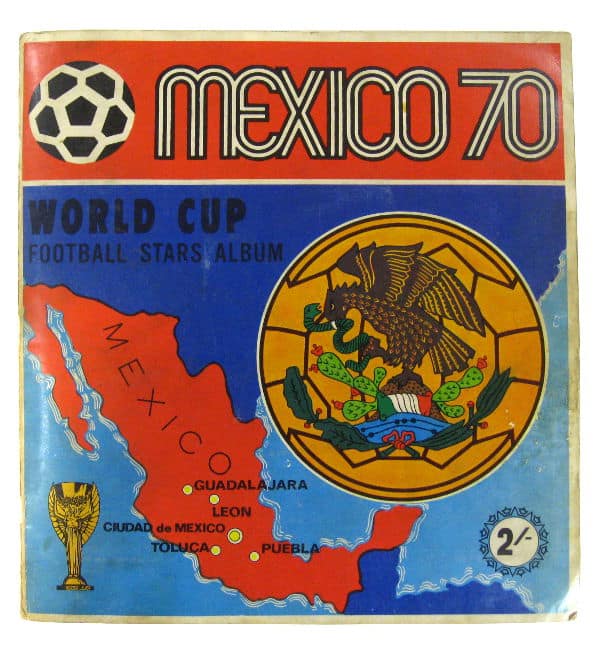




As a 9 year old German boy, the World Cup of 1970 was the most fascinating tournament. All my childhood heroes were on the pitch. Not only the German players like Beckenbauer, Müller, Seeler, Overath or Schnellinger. The Brazilian team was full of soccer artists with legandary Pelé. The Italian and English squad had so many big names like Rivera, Mazzola, Riva, Charlton, Moore, Banks.
Although I watched so many World an European Cups in my life, I always remember Mexico 1970, when I became a soccer addict.
Uwe, it’s great to hear from someone who saw the tournament at the time. I hope the article brought back some good memories. Mexico 1970 has its own place in World Cup history, what a great experience it must have been to watch it live. Thank you for commenting!
Great post as always. Just a couple of observations:
The match schedule for the early rounds was a little haphazard. One game on the opening day, none the following day and then seven in two days. Followed by two days with no games.
A strange occurrence in that the two CONCACAF teams – Mexico and El Salvador – were drawn in the same group.
Brazil don’t appear to have been seeded for some reason – hence they being drawn with England.
Many of the matches and the knockout games all kicking off simultaneously. Not great for TV viewers!
Hello John, thanks for reading. Some interesting observations there – although there were signs of its corporate future, the tournament then was certainly more disorganised and less TV-orientated than the modern version.
Barry Davies said years later that on quarter final day he was reporting on the Italy – Mexico game and when that game was over he immediately had to find a hotel which was showing the extra time period of the England – West Germany game ….